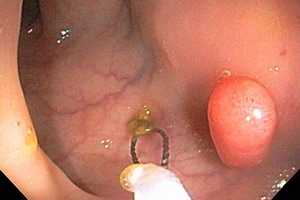 A colorectal cancer screening refers to various health screenings to help colon cancer (colorectal cancer) can be detected as early as possible. Colon cancer is the second most common cancer and also the second most common cause of death in the Germany.
A colorectal cancer screening refers to various health screenings to help colon cancer (colorectal cancer) can be detected as early as possible. Colon cancer is the second most common cancer and also the second most common cause of death in the Germany.
Most colorectal cancer is initially benign Proliferations of mucous membrane intestinal polyps (adenomas). These growths grow very slowly, therefore the chance of recovery thanks to the available check-ups are the better, the earlier the disease is noticed. Who regularly goes to the colorectal cancer screening, has therefore good prospects of a cure in the event of illness.
In the context of the colorectal cancer screening, following screening can be used:
- Palpation (digital rectal examination)
- Test for hidden blood in the stool (Hämocculttest)
- Colonoscopy (colonoscopy)
Colorectal cancer – incidence and risk factors
More than 35,000 men and women get per year in Germany colon cancer (colorectal cancer). With around 17,500 deaths, colorectal cancer is the second most common cause of death among the cancer also.
The causes of colorectal cancer are varied. Several factors can increase the risk of disease. In addition to other existing cancers (for example, ovarian cancer, cervical cancer) belong mainly hereditary predisposition, chronic intestinal inflammation, adverse eating habits, obesity, lack of exercise, alcohol consumption and smoking as risk factors.
Hereditary predisposition (hereditary predisposition)
There are already cases of colorectal cancer, in closer relationship is an increased risk of colorectal cancer.
Chronic inflammatory bowel disease
Chronic inflammatory diseases such as Crohn’s disease and ulcerative colitis, which go hand in hand with persistent diarrhea and frequent Chair offerings, increase the risk of colorectal cancer – especially in ulcerative colitis. Is the ulcerative colitis for 25 years or longer and the entire colon is affected, the risk for colorectal cancer is about 40 percent.
Low-fiber, fat and meat-rich diet
A poor diet can increase the risk of colorectal cancer. Such favors as a low-fiber diet, so a diet with little fiber, the development of colorectal cancer. Similarly, too much fat and frequent consumption of heavily salted, smoked and cured meat products (sausages, ham, for example) may as well as alcohol to promote the development of cancer.
Who should go to the colorectal cancer screening?
The incidence of colorectal cancer people goes up rapidly to the 50th year of life around. Therefore, it makes sense to take of the statutory health insurance (GKV) from offered the 50th year, annual colorectal cancer screening, to complete. It includes a test for hidden blood in the stool (Hämocculttest) for over 50-Jährige a palpation of rectum and 50 to 54. For people over 55 years of age, the statutory health insurance offer a colonoscopy (colonoscopy). She needs the result of colonoscopy in order, is to be reviewed after ten years. Alternatively a Chair test can be performed every two years. Your doctor can advise you about the different advantages and disadvantages.
Risk factors already exist – such as for example a colorectal cancer case in the family, should be initiated with the screening already before the age of 55. Also at signs such as blood in the stool or frequent diarrhoea, it is recommended to perform check-ups, to exclude a colorectal cancer disease.
Who pays for the colorectal cancer screening?
The statutory health insurance companies assume the cost for the screening of annual colorectal cancer screening for insured persons from the age of 50.
What is investigated?
In addition to a detailed conversation about possibly present risk factors, following investigations among the colorectal cancer screening depending on the age or personal situation:
- Palpation (digital rectal examination)
The palpation (digital rectal investigation) is intended for persons over the age of 50. In the process, the doctor introduces a glove-protected, greased a finger in the anus and scans the rectum (rectal) to flashy, nodular structures. One is a relaxed during the investigation, the investigation becomes the less uncomfortable. The doctor at the palpation finds Nodular changes, followed by further investigation using a colonoscopy (colonoscopy).
All colorectal cancer people evolve near the anus 25 percent. The annually offered palpation can detect 10 percent of all diseases.
Haemocculttest
The statutory health insurance funds for persons from the 50th to the 54th annually offer the Hämocculttest age. For the Hämocculttest it applies a week a small stool sample from three different chair aisles on three strips of paper with an attached spatula. The test will be evaluated by the doctor or sent to the lab, and smallest quantities not detectable to the eye, blood in stool makes visible. The test indicates that blood is in the Chair, the cause is usually with a colonoscopy examines closer.
Colonoscopy (colonoscopy)
The statutory health insurance funds from the 55th offer a colonoscopy (colonoscopy) within the framework of the colorectal cancer screening at the age. The Colonoscopy is not only the most accurate analysis, it allows also the simultaneous taking of tissue samples (biopsy), as well as the immediate removal of any intestinal polyps, so benign cancer precursor. She needs is the colonoscopy without finding, to be reviewed after ten years.
Want to or can you not perceive the colonoscopy, is possible from the age of 55. Alternatively every two years a Hämocculttest.




















